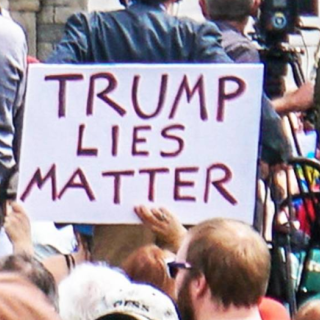Domination at Home and Abroad
For the progressives in the United States, June 2018 is the cruelest month under Donald Trump's presidency. The Supreme Court of the United States has delivered one painful blow after another this month: Husted v. A. Philip Randolph Institute (allowing states to aggressively purge voting rolls); NIFLA v. Becerra (permitting deceptively named "crisis pregnancy centers," on "free speech" grounds, to hide the availability of free to low-cost state-subsidized abortions from women seeking help); Trump v. Hawaii (upholding the "Muslim Ban"); and now Janus v. AFSCME (aimed to radically reduce the public-sector unions' financial resources), which pushes each and every public-sector union into a post-Janus struggle to survive without fair share fees and still fight for the interests of all workers in the bargaining units.
At the same time, the Trump administration is pressuring all countries to completely stop importing oil from Iran by November 4, seeking to impose an economic blockade on that nation. This act of indiscriminate economic warfare -- as well as the "Muslim Ban," a large majority of whose victims are Iranians, whether or not they support Iran's current system of government -- proves that the target of US imperialism is not just Iran's power elite but the Iranian people as a whole and their pursuit of independence and development. Plus any other nation who also cherishes their sovereignty, as even major "allies" of the United States like Canada, the European Union, and Japan are beginning to realize, now that they themselves, like China and Mexico, have become targets of trade tariffs and secondary sanctions.
In short, the US Right, having monopolized the executive, legislative, and judicial powers of the country, has removed the mask of hegemony by consent and bared the naked face of domination at home and abroad.
From Trade War to Class War
Domination at home has met a great deal of resistance: airport protests against the "Muslim Ban," women's marches, teachers' strikes, sanctuaries, and so on. Trump is personally unpopular, and his policies are at odds with the majority opinion on many issues -- sharply so on immigration, perhaps to the surprise of rightists emboldened by the egregious Supreme Court decision: 75% of Americans say immigration is good for the United States, the most since 2001, according to Gallup.
Nevertheless, on one issue Trump has grown rather popular: his handling of economy. The June 16-19 CNBC poll reports that, since the last survey in March, his economic approval rating has "surged 6 points" to 51%, reaching a majority for the first time since the beginning of his presidency, while disapproval has dropped 6 points to just 36%. Why the surge in approval, despite that the real average hourly earnings of most workers actually declined from May 2017 to May 2018? One reason may be the siren song of economic nationalism, Trump's trump card in the industrial Midwest, to which the leadership of US organized labor is also susceptible. "[T]hese [steel and aluminum] tariffs [imposed by Trump] are a necessary first step and we are proud to support them," wrote AFL-CIO President Richard Trumka in the Washington Post back in March, assuring skeptics: "Tariffs are a normal tool of trading partners, not the opening shots in a trade war." Since then, the AFL-CIO leadership has tried to diplomatically retreat, seeing Trump rapidly and vastly escalate the scope of his trade war.
Activists have our work cut out for us: re-orient the labor movement, from trade war to class war. As pro-labor economists Dean Baker and Martin Hart-Landsberg argue, Trump's protectionism does not protect US workers at all -- it's all about protecting the monopoly profits of nominally American multinationals, particularly by using tariffs as bargaining chips to get the targeted countries to accept longer and stronger patent protection, from which US workers actually suffer rather than benefit, as shown clearly in the case of pharmaceuticals whose prices are raised sky-high by patent-protected monopolies.
Workers have no business signing up for a rich man's war, be it an economic war or an actual shooting war -- we should be, instead, fighting for workers' rights, our own and our fellow workers', in Asia or Europe, in Africa or the Americas.
Which Way Forward?
Easier said than done. For now, we need to first continue supporting our own local unions, our own local communities (like Black, Queer, and Intersectional Columbus and the Columbus Sanctuary Collective), our own local media (like The Free Press), as indispensable bases of resistance, learning tactics and philosophies from our radical forebears as well as our international allies, to whom we owe the duty to remain independent of any imperialist party.



